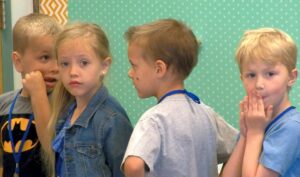¡El día 17 de febrero es el Día de los actos espontáneos de bondad! Los actos espontáneos de bondad pueden aparecer de diversas maneras. Cuando enseñamos a nuestros niños y niñas lo que es un acto espontáneo de bondad y cómo hacerlo, estamos creando las condiciones para mejorar el ambiente de nuestras casas, escuelas, y comunidades. Nuestro mundo a menudo parece un caos total con muchas personas en contra de las demás. Luego llega la clara luz del día por medio de una sonrisa que vemos en el estacionamiento, una palabra comprensiva de una amiga, o el perdón que recibimos cuando sentimos que no lo merecemos. Los niños son embajadores perfectos para la bondad.
Y ¡enseñar a los niños a demostrar la amabilidad es una buena manera de enseñar y reforzar la empatía! Puede lograrlo simplemente al preguntar a su niña cómo cree que se sentirá otra persona cuando ella le hace algo amable. Podría decir algo como “¿Cómo crees que se sentirá nuestro vecino, el Sr. Pablo, cuando le traemos estas galletas que me ayudaste a preparar?” Si se le hace difícil a su niño o niña ponerse en el lugar del otro, puede ayudarle al decir “¿Cómo te sentirías si alguien te fuera a traer galletas cálidas y ricas?…Sí. Te sentirías contenta. Me imagino que así también se sentiría el Sr. Pablo.” Finalmente, puede ayudar a su niño o niña a sentirse bien con lo que hizo, y aumentar la posibilidad que hará cosas amables en el futuro al pedirle que reflexione sobre lo bueno que nos sentimos cuando le hacemos sentir bien al otro. Podría decir algo como, “¿Cómo te sientes cuando sabes que acabas de hacerle sentir feliz al Sr. Pablo?…Es cierto. ¡También te hace sentir feliz! Cuando hacemos cosas amables para otras personas, ellos se sienten bien y nosotros nos sentimos bien, también.” Cuando sentimos empatía con otros y nos sentimos bien por haber hecho algo bondadoso, ¡el mundo puede llegar a ser un lugar más amable!
A continuación hay una lista de sugerencias fáciles para cosas que los niños pueden hacer para expresar su bondad. ¡Haga su propia lista de actos espontáneos de bondad!
- Regalar una flor
- Almorzar con alguien nuevo
- Hacer caso a su corazón
- Visitar a un amigo/a enfermo/a
- Limpiar la acera de un vecino
- Ofrecer una sonrisa
- Hacer una nueva amistad
- Limpiar la basura en la calle
- Decir hola
- Abrirle la puerta a alguien
- Ayudar a cargar algo pesado
- Compartir un bocadillo
- Agradecer a un maestro o mentor
- Dejar una nota de agradecimiento
- Ofrecer su asiento
- Dejar que otra persona vaya antes que usted
- Hornear galletas para compartir
- Dar un cumplido
- Donar sus juguetes apenas usados
- Prestar su lápiz
- Respetar a los demás
- Llevar a pasear el perro de un vecino
- Sonríele a alguien
- Perdonar las equivocaciones
Para más información sobre el Día de los Actos Espontáneos de Bondad (lo cual puede extender a lo largo de toda la semana) vea la página web de La Fundación Random Actos of Kindness.
[divider type=”standard” text=”Go to top” full_width=”no” width=”1/1″ el_position=”first last”]
Image: © Monkey Business Images| Dreamstime.com



